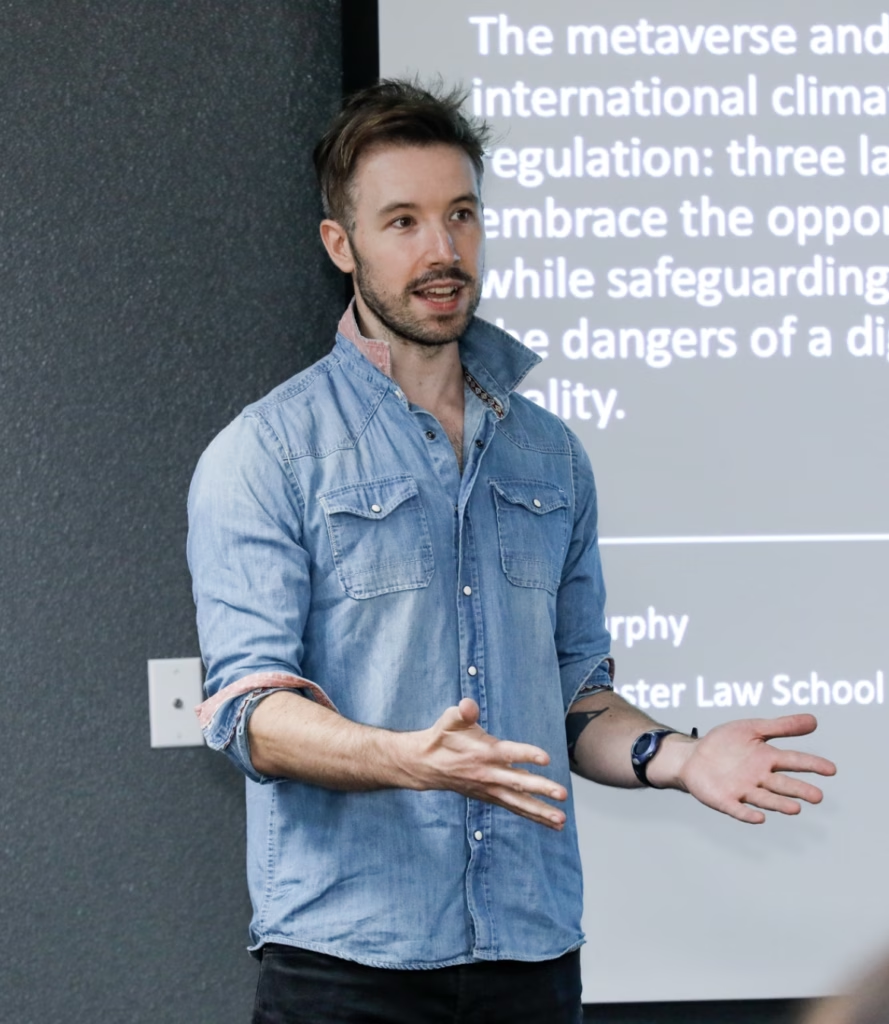Once upon a time technologies like artificial intelligence and the metaverse were confined to the annals of science fiction. No longer, both innovations exist in the here and now, with vast potential to transform our world. These emergent technologies, however, are not without attributes of concern, one of which is energy consumption and the consequent emissions.
These technologies and their transformative capacity are no doubt here to stay so this short brief posits that we must chart a pathway to responsible regulation of their energy consumption before the tech world runs away with itself.
Trusting the tech world with climate protection?
The tech industry positions itself as the forerunner of tomorrow’s world, embracing policies of carbon neutrality. Alphabet have pledged to meet net zero; Apple are seeking supply chain neutrality by 2030; Microsoft’s Azure platform is intended to run on renewables by 2025; and Meta claim to have already reached net zero emissions. Examining Meta, it convincingly pushes a carbon neutral narrative, yet inspection reveals some of this rhetoric might just be hot air.
Meta purchases only clean energy so is able to make an allowable claim of carbon neutrality. However, Meta is draining the market and its Irish datacentre used the equivalent clean energy of 151,000 homes in 2021. It is not resupplying energy grids, nor is it engaged in projects advanced enough to generate replacement energy. Yes, Meta does have some green proclivities, and is involved in restoration projects, but these are all located in the USA and lack efficacy when compared to energy consumption.
Meta is not alone in needing to take greater responsibility for energy use, and the American Clean Power Association finds that 48% of all clean energy is consumed by the tech industry. Sector wide realignment from power purchase agreements to restoration and generation is required if carbon neutrality is to be legitimately achieved. Silicon Valley sustainability narratives lack impression, even without considering the energy habits of transformative emergent technology.
The metaverse, AI, and energy consumption – is it an issue?
Looking at the metaverse, it is difficult ascertain energy usage data because it remains in embryonic form. Yet, if we consider that in 2011 Meta was using 0.53 terawatt-hours compared to 11.51 in 2022, it is reasonable to assume that introducing a vastly more immersive technology than the current Web2 will cause energy consumption to skyrocket.
Moreover, the Metaverse is intended to reach a plateau not unlike the fictional Ready Player One. Chip producer Intel thinks a 1000 fold increase in computing power will be required, no doubt having a commensurate uptake in energy demand. This means that in terms of powering the technology, and the sheer scale of its inevitable popularity, energy consumption will be gargantuan. Efficiency gains in hardware might negate some of this demand, and arguments have been put forward that the metaverse will be responsible for a drop in vehicle emissions. Yet, these arguments remain speculative and unreliable as a means of mitigation.
Where AI is concerned, the evidence surrounding its energy use is more readily visible. Training an AI model in 2019 generated 626,000 pounds of CO2, about five times more than that generated by a car over its lifetime. A ChatGPT prompt uses 2.9 watt-hours of electricity, compared to a standard google search that uses 0.3 watt-hours. Cloud data centres are predicted to double their energy consumption to 1000 terawatts by 2026, in part because of the increased use of AI. The cooling of these datacentres is also problematic, with Google, for instance, already using 25% of the water supply of the city of Dallas to cool its databanks.
Staggering as they are, these figures may just be the tip of the iceberg. It remains challenging to attribute accurate greenhouse gas emissions to the use of AI due to an absence of regulatory oversight, allowing tech corporations to select what they report in terms of energy use and emissions. This gap led to the European Union adopting the Regulation on Artificial Intelligence Act 2024 that aims to put reporting and calculation models in place for the consumption of energy related to AI. While this step is welcomed, discussions must be had at the global level.
Responsible practice through a global charter
AI, the metaverse and any other emergent technology requires a set of foundational principles to regulate their impact upon the climate and wider environment. We need an international technology charter, one that is agreed upon universally and given resources and scope to be effective.
A charter is distinguishable from treaties which come with the trappings of consent, sovereignty, and endless political sabotage. Also, treaties are state orientated, and while governments have a role to play, the tech world is perhaps more influential than ever before, so the big players in the sector should not be absolved from involvement.
A charter can reflect this reality, placing the technology sector front and centre of the creation process. That does not mean allowing corporations to draft it themselves, that lesson is poignantly brought to life in Orwell’s Animal Farm. But it does mean bringing their expertise to bear in the drafting alongside climate, environmental and energy specialists.
This charter must come from informed dialogue and good faith cooperation between relevant stakeholders. Yet, there are some core principles that would be reasonable from the outset.
First, emergent technology must be energy positive and not deplete clean power. It must be completely reliant on renewable energy streams distinct from the primary power grid.
Second, emergent technology in its operation must not harm the environment. Datacentres and infrastructure must be located in brownfield sites, not situated in leafy green areas where development damages the natural environment. Alongside, use of resources, like water for cooling, must come from dedicated recycling activities.
Third, emergent technology, and particularly the metaverse, must in good spirit seek to promote environmental protection through education. It must not become a substitute for the real world, but an advocate for advancing knowledge and preservation.
From these central principles, others must drive the discussion for a charter that ensures the future impact of emergent technology is positive. For it is a bleak tomorrow where humanity retreats to a digital world in search of green spaces and climate stability. The time to act is now, before one avatar says to another, “where were your parents when the climate collapsed?”

Ash Murphy is a Senior Lecturer at Manchester Law School (MMU), researching in the field of international climate, energy, security and technology law. The lens through which this research is conducted is always planetary protection and climate security, using innovative solutions to solve problems. Email: a.murphy@mmu.ac.uk.





